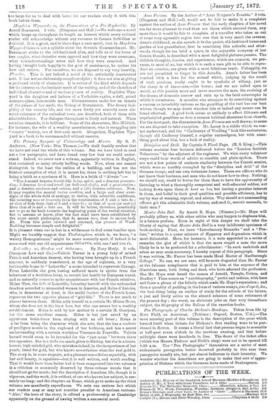Lakeville ; or, Shadow and Substance. By Mary Healy. 3
vols. (Sampson Low and Co.)—Valerie Turner is a young lady of mixed French and American descent, who having been brought up in a French convent, is suddenly transferred, at the age of eighteen, to a very fashionable home in " Lakeville," a name intended to represent Chicago. From Lakeville she goes, having suffered much in spirits from the behaviour of a worthless lover, to recruit her health by European travel, and so naturally comes to make acquaintance with her French relatives. Helen West, the belle of Lakeville, behaving herself with the unbounded freedom accorded to unmarried women in America, and Reins d'Antoire, who, in demeanour at least, is the model inge'nue of the French home, represent the two opposite phases of "girl-life." There is not much to choose between them. Helen sells herself to a certain Mr. Hiram Dross, -whom she does not in the least love, but who can assure her a wealthy establishment. Reine is sold by her mother to a certain M. Gonrjean, for the same excellent reason. Helen is but just saved by an opportune brain-fever from eloping with an old lover ; Reine is o far from being the character which she acts, that she has a cachette of profligate novels in the cupboard of her bedroom, and has a secret understanding with a certain worthless Viscomte de Tourville. Valerie herself would seem to be intended for the "just mean " between these two opposites. She is a trifle too much given to flirting, bat she is a brave, honest, high-minded girl, who mistakes indeed, in tho inexperience of her youth, tinsel for gold, but who knows nevertheless what the real gold is. The story is, in some respects, not a pleasant one—Reine especially, with her evil beauty, is repulsive—but it is well written, and worth reading. That it would have been better had it been compressed into two volumes is a criticism so commonly deserved by three-volume novels that it should not go for much; but the description of American life, though it is vigorous, and the work, it is evident, of one who knows her subject, is cer- tainly too long; and the chapters on Rome, which go to make up the third volume, are manifestly superfluous. We note one curious fact which our readers may or may not consider peculiar to American customs. "Alec," the hero of the story, is offered a professorship at Cambridge apparently on the ground of having written a successful novel.


































 Previous page
Previous page